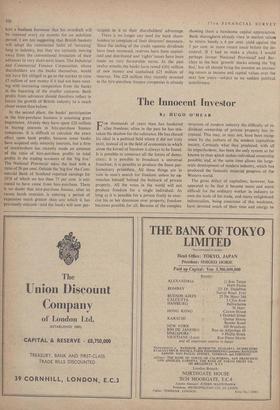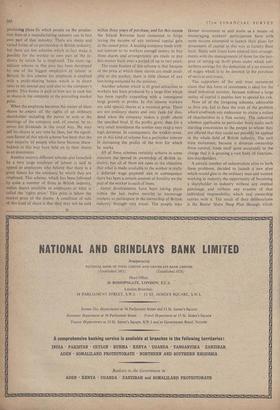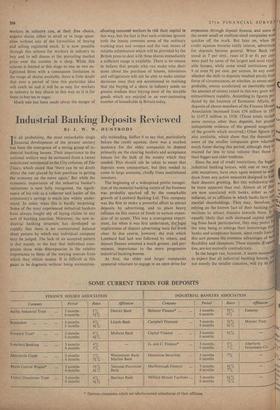The Innocent Investor
By HUGO O'HEAR FOR thousands of years man has hankered after freedom; often in the past he has mis- taken the shadow for the substance. He has chased his ideal in a political field where it did not truly exist, instead of in the field of economics in which alone the kernel of freedom is always to be found. It is possible to construct all the forms of demo- cracy; it is possible to broadcast a universal franchise; it is possible to produce the finest par- liamentary procedure. All these things are in vain in man's search for freedom unless he eta- trenches himself behind the bulwark of private property. All the votes in the world will not produce freedom for a single individual. As long as it is possible for a person freely to exer- cise his or her dominion over property, freedom becomes possible for all. Because of the complex structure of modern industry the difficulty of in dividual ownership of private property has in- creased. This may, or may not, have been recog- nised by the authors of the modern capitalistic society. Certainly what they produced, with all its imperfections, has been the only system so far known to man which makes individual ownership possible; and, at the same time allows the large- scale development of modern industry, which has produced the fantastic material progress of the Western world.
The great defect of capitalism, however, has appeared to be that it became more and more difficult for the ordinary worker in industry to own the tools of his trade, and many enlightened industrialists, being conscious of this weakness, have devoted much of their time and energy to producing plans by which people on the produc- tion lines of a manufacturing industry can in fact own part of that industry. There are many and varied forms of co-partnership in British industry, but there are few schemes which in fact make it possible for the worker to own part of the in- dustry by which he is employed. The most sig- nificant scheme in this area has been developed by one of the biggest employers of labour in Britain. In this scheme the employee is credited with a profit-sharing bonus which is in direct ratio to his annual pay and also to the company's profits. This:bonus is paid to him not in cash but in shares in the company.at the prevailing market price.
When the employee becomes the owner of these shares he „enjoys all the rights of an ordinary shareholder including the • power 'to vote at the meetings of the company and, of course, he re- ceives his dividends in the usual way. He may sell his shares at any time he likes, but the signifi- cant factor of this whole scheme haS been that the vast majority of people who have become share- holders in this way have held on to their shares as an investment. •
Another entirely different scheme also launched by a very large employer of labour is said to appeal to employees. who believe that there is a great future for the company by which they are employed. This scheme, which has been followed by quite a number of firms in British industry, makes shares available to employees at what is called the 'rights price.' This price. is below the market price of the shares. A condition of sale of this kind of share is that they may not be sold
within three years of purchase, and for this reason the Inland Revenue have consented to forgo taxing the income of any notional capital gain in the issued price. A leading company lends with- out interest to its workers enough money to buy these shares and arrangements are made to pay this money back over a period of up to two years.
The main feature of this scheme is that because of the price at which these shares are made avail- able to the -worker, there is little chance of any loss being sustained by the investor.
Another scheme which is of great attraction to workers has been produced by a large firm which has been rapidly expanding with a consequent large growth in profits. In this scheme workers are sold special shares at a nominal price. TheSe are not ordinary shares and only rank for divi- dend when the company makes a profit above the specified level. If the profits grow, then for a very small investment the worker may reap a very high dividend. In consequence, the worker-inves- tor in this kind of scheme has a particular interest in increasing the profits of the firm for which he works.
- All of these schemes certainly achieve in some measure the spread in ownership of British in- dustry, but all of them are open to the objection that what is made available to the worker is really a deferred wage payment and in consequence there has been a certain amount of hostility on the part of the worker to each of them.
Great developments have been taking place within the last twelve months to encourage workers to participate in the ownership of British industry through unit trusts. The people who favour investment in unit trusts as a means of encouraging workers' participation have with some success attempted to launch their plans for investment of capital in this way at factory floor level. Many unit trusts have entered into arrange- ments with the managements of firms for the pur- pose of setting up thrift plans under which sub- scribers arrange for the deduction of a set amount of wages which is to be devoted to the purchase of units in unit trusts.
The supporters of the unit trust movement claim that this form of investment is ideal for the small industrial investor, because without a large outlay of capital it enables him to spread his risk.
Now all of the foregoing schemes, admirable as they are, fail to face the crux of the problem which confronts any endeavour to create a nation of shareholders in a free society. The industrial schemes applicable to particular firms make such startling concessions to the people to whom they arc offered that they could not possibly be applied in the whole field of British industry. The unit trust movement, because it divorces ownership from control, lends itself quite accurately to the charge that it is cleating a vast body of function-. less shareholders.
A certain number of industrialists alive to both these problems, decided to launch a new plan which would give to the ordinary man and woman working in industry the opportunity of becoming a shareholder in industry without any implied patronage and without any evasion • of that individual responsibility which real ownership carries with it. The result of their deliberations is the Bearer Share Shop Plan through • which workers in industry can, at their free choice, acquire shares either in small or in large quan- tities without any of the formalities of buying and selling registered stock. It is now possible through this scheme for workers in industry to buy and to sell shares at the prevailing market price over the counter in a shop. While this scheme is limited at this stage to one or two en- lightened firms with a consequent limitation in the range of shares available, there is little doubt that over a period of time this particular idea will catch on and it will be as easy for workers in industry to buy shares in this way as it is for them to buy tea or sugar.
Much ado has been made about the danger of allowing innocent workers to risk their capital in this way, but the fact is that such criticism ignores both the innate common sense of the ordinary working man and woman and the vast waves of reliable information which will be provided by the British press to deal with these shares immediately a sufficient range is available. There is no reason to believe that people who can make wise deci- sions about the purchase of houses, televisions and refrigerators will not be able to make similar decisions once they are accustomed to realising that the buying of a share in industry needs no greater wisdom than buying most of the durable goods which are enjoyed in an ever-increasing number of households in Britain today.
















































 Previous page
Previous page